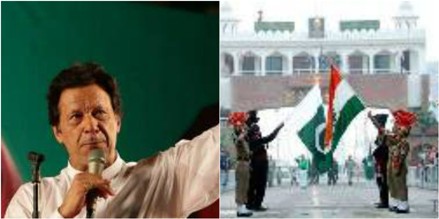

Imran Khan And Indo-Pak Relations
Imran Khan is most likely to be the next prime minister of Pakistan. It has been an amazing journey for him as, despite his obvious charishma, not many thought that he would be able to survive the grind and machinations of Pakistani politics. But the man has proved them wrong. 22 years after he started out in politics, Imran Khan is set to achieve the ultimate dream of every politician leading his country.By Sunil Garodia
First publised on 2018-07-27 08:13:26
For India, his elevation to the top post is not likely to work for improving relations between the two countries. For, Imran is considered to be a puppet of the Pakistani army, known to be the real power centre in that country. Not that any civilian government in Pakistan can act independently, especially in matters of foreign policy and regulating the mushrooming terrorist groups that target India, but if Imran is really in the hands of the army as alleged, he would have little say in improving relations with India.
On the other hand, Imran Khan has better knowledge of India than most other Pakistani politicians. He toured the country twice, in 1979 and 1987, with the Pakistani cricket team. He has interacted extensively with players, administrators, general fans and even Indian politicians during those tours and has first-hand knowledge of how the system works in India and what Indians think about Pakistan. On paper, he is better equipped to improve relations.
Hence, if he wishes, he can let the army guide him in matters of utmost sensitivity (which in any case cannot be solved overnight) but make a beginning by plucking low hanging fruits. There are many areas where trust needs to be built in order to move to the next step in improving relations. Cross border firing is one such issue. Imran must impress upon the army to desist from undertaking this largely avoidable and wasteful exercise that benefits none. If it stops, India will stop retaliating and people in both countries living near the border will be able to live peacefully.
Next on the list is placing trained terrorists in India. Despite Pakistans repeated denials, the whole world knows about the existence of training camps for terrorists on Pakistani soil. They are then made to cross the border, obviously with help from the Pakistani army (in fact, most military strategists believe that border firing is at many times a diversionary tactic used by the Pakistani army in order to let terrorists slip into India from nearby areas). If Imran manages to stop this, it will build huge trust in India.
Much cannot be expected from Imran Khan vis-à-vis improving Indo-Pak relations. But beginnings must be made. Apart from the two issues spelled out above, both governments must identify other areas of immediate concern and work out ways to neutralize them. Indo-Pak relations need to be improved on a daily basis. There are no quick-fixes. It is not as if that one fine day the governments of both countries will sit together and resolve all issues. It is going to be an extremely slow and painful exercise and both countries will need a lot of sagacity to achieve that. But as long as the Pakistani army calls the shots in foreign policy, no civilian government can hope to do much.











